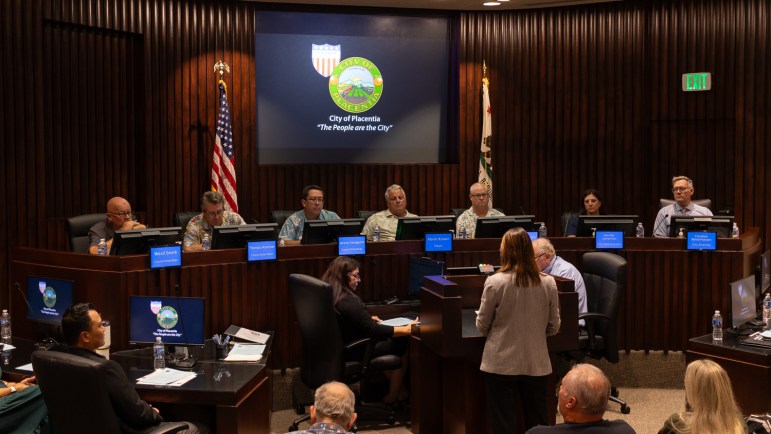Placentia won’t see any new short term rentals coming to local neighborhoods for up to one year.
The temporary ban comes as city council members and staff are forming new regulations to crack down on problematic short term rentals – commonly known as Airbnbs.
“We have to figure out the correct way to enforce them because more laws don’t mean anything unless they get enforced,” Mayor Kevin Kerwin said during the Sept. 2 meeting, when officials enacted the initial 45-day moratorium.
Last week, Placentia City Council members voted unanimously to extend the moratorium on new short term rentals for up to one year to buy officials time to come up with an ordinance regulating the homes.
The small North Orange County town joins a host of cities throughout the county that paused approving new short term rentals so officials can beef up regulations – like Dana Point, which adopted stronger regulations and streamlined the approval process earlier this year.
[Read: Dana Point Streamlines Short-Term Rental Approvals, Cracks Down on Unpermitted Ones]
Other cities, like Stanton, have outright banned short term rentals after rising resident complaints of overcrowded streets and noisy parties.
[Read: Stanton Becomes Latest Orange County City to Ban Airbnbs]
Like Placentia, municipalities throughout Orange County have struggled with how to best regulate short term rentals while also benefiting from tax revenue the rentals generate through hotel bed taxes – commonly referred to as transient occupancy tax by city officials.
While Placentia City Council members didn’t have much discussion on the issue at the Oct. 7 meeting, elected officials discussed the issue at length during the Sept. 2 meeting when they first enacted a 45-day moratorium on short term rentals.
During that meeting, council members brainstormed how to best enforce any potential new regulations – either through code enforcement officers or police officers – along with stricter laws.
 The Placentia City Council meeting on Sept. 2, 2025. Credit: ERIKA TAYLOR, Voice of OC
The Placentia City Council meeting on Sept. 2, 2025. Credit: ERIKA TAYLOR, Voice of OC
Councilman Ward Smith said not all short term rental operators run bad operations, but added that Placentia needs stricter regulations to curb problematic operators.
“It only takes a few to jack everything up for everybody else in the program,” Smith said during the Sept. 2 meeting.
Smith – with support of his colleagues – said city officials need to consider hefty fines on problematic short term rentals.
“We need to bring a hammer,” Smith said.
Director of Development Services Joe Lambert told council members there were 71 active short term rentals in the city as of Sept. 2.
According to a staff report, officials are looking into a cap on short term rentals – half a percent of Placentia’s nearly 17,000 homes.
That means no more than 85 short term rentals could operate within Placentia if council members institute the cap.
“It seems like the burden has come onto Placentia since everyone else is capped except for us in the area,” Councilman Jeremy Yamaguchi said at the Sept. 2 meeting.
Some of the proposed regulations also include limiting the number of guests booked at short term rentals, annual permit reviews, annual site inspections and limiting the number of permits to two per applicant.
The city could make up to $235,000 annually in hotel taxes from the short term rentals, according to a staff report.
Councilman Thomas Hummer said tighter regulations need to be drawn up to help preserve the city’s quiet bedroom community.
“Make these issues become non-issues with more stringent rules and regulations on how we get them out of our city,” Hummer said.
 Cars driving down Kraemer Blvd. in Placentia, Calif. on Feb. 16, 2025. Credit: BRIAN GUEVARA, Voice of OC.
Cars driving down Kraemer Blvd. in Placentia, Calif. on Feb. 16, 2025. Credit: BRIAN GUEVARA, Voice of OC.
Mayor Kerwin suggested staff consider forcing Airbnb owners to book people for at least two nights in an effort to cut down on rented party houses.
“That’s a way to also discourage the college kids coming to have a weekend frat party at somebody’s house,” Kerwin said.
Councilman Chad Wanke, cautioned against lumping all short term rentals together.
“I will point out that short term rentals doesn’t mean there is going to be a problem,” Wanke said, adding that people with large families like him find Airbnbs are more useful than hotels when on vacation.
Like his colleagues, Wanke said city regulations need to focus on the wallets of short term rental owners if the houses become an issue.
“The owners have to have skin in the game,” Wanke said, adding that they should be reachable by phone in case of problems or face steep fines.
“I think we need to go overboard in protecting the people that live here,” he said. “The penalties need to get higher, faster.”
Spencer Custodio is the civic editor. You can reach him at scustodio@voiceofoc.org. Follow him on Twitter @SpencerCustodio.
Related

